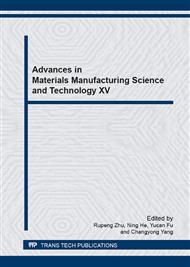p.89
p.95
p.100
p.106
p.110
p.116
p.120
p.126
p.130
Geometry Optimization of D-Type Micro End-Mill with FEM Analysis
Abstract:
In recent years, micro-machining has obtained increasingly attention and been more and more widely used in the field of machining. As a vital important aspect in the design of micro-tool, traditional tool geometry design methods need to be improved. In this paper, the mathematical model of D-type micro end-mill is developed; FEM analysis using ABAQUS 6.12 is employed to optimize the geometry parameters of D-type micro end-mill, which is proved to be a very convenient method. For small diameter tools, strength is the primary factor to be considered in their design, so the target of optimization is to minimize the maximum principal stress and deformation of the micro-tools.
Info:
Periodical:
Pages:
110-115
DOI:
Citation:
Online since:
October 2013
Authors:
Price:
Сopyright:
© 2014 Trans Tech Publications Ltd. All Rights Reserved
Share:
Citation:


